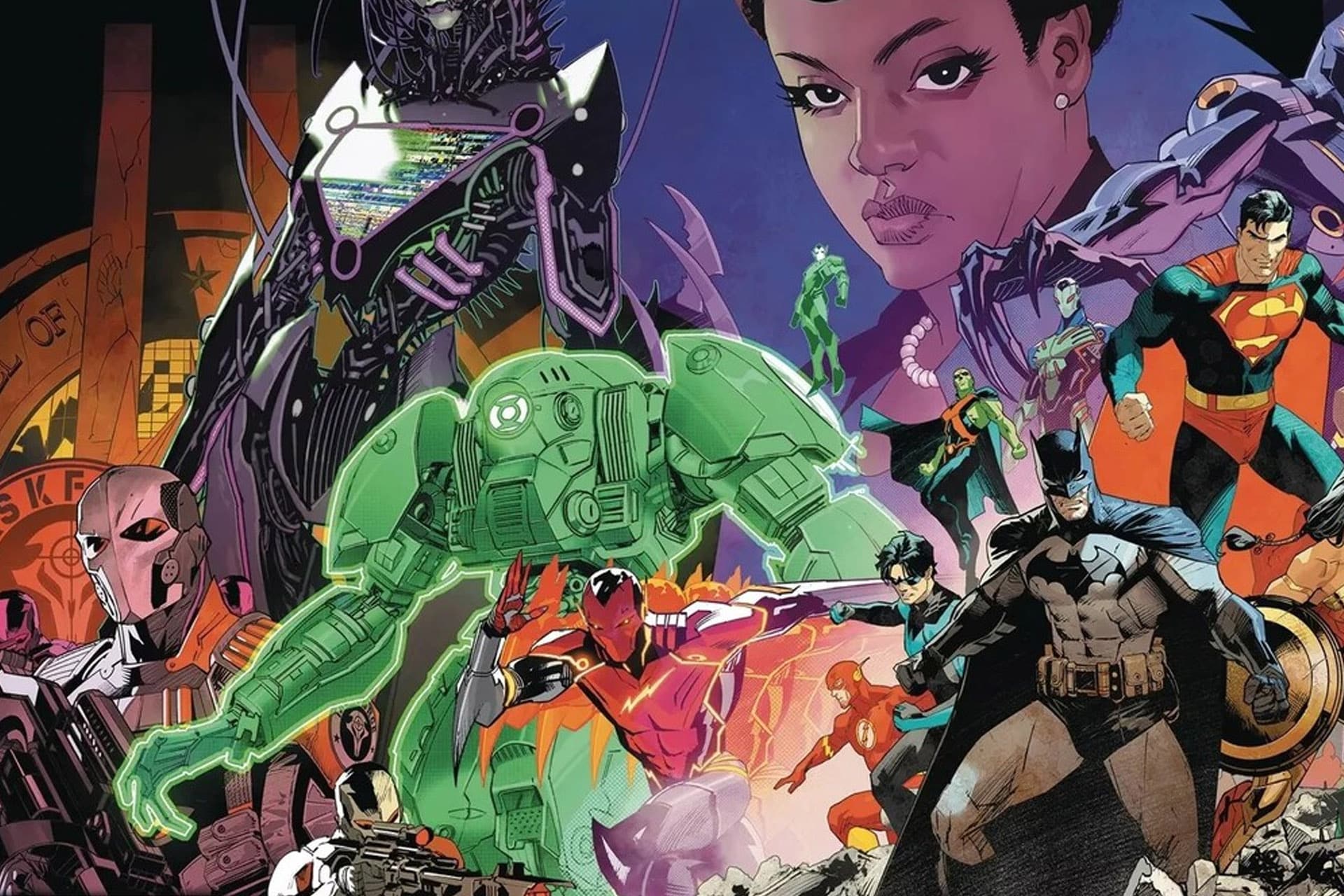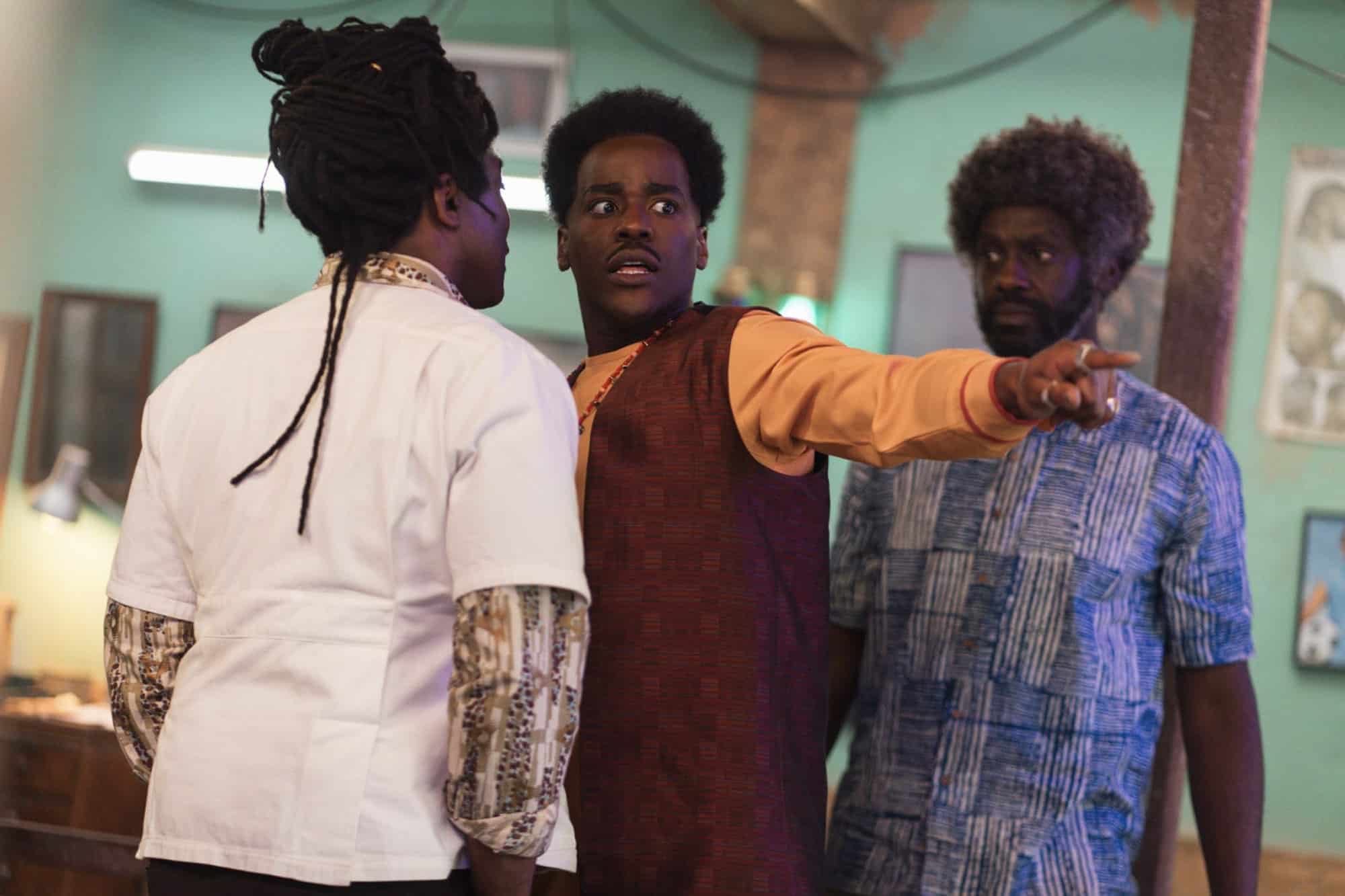
Doctor Who | Series 15 | Episode: 3 | ‘The Well’ | Duration: 47 minutes | Writer: Russell T. Davies, Sharma Angel-Walfall | Director: Amanda Brotchie | Starring: Ncuti Gatwa, Varada Sethu, Rose Ayling-Ellis, Caoilfhionn Dunne, Christopher Chung, Bethany Antonia
Still attempting to triangulate their way back to Earth in 2025, the TARDIS crew land 500,0000 years in the future, and immediately plummet to an irradiated planet as part of a team of elite troopers investigating after contact was lost with a mining colony. Inside, about half of the 35 colonists are found broken and battered, the rest shot, except for one – a cook who’s scared for her life after having to shoot her best friend.
The Doctor investigates the mysteries of the vast well heading miles to where no light has ever fallen, while Belinda tends to the scared cook, Aliss. As the Doctor discovers he’s returned to a planet millennia after one of the scariest experiences of his lives, Belinda and the marines are sure they see something that can’t possibly exist behind the sole survivor.
“If it was a clock face, you die at midnight.”
There’s no way to talk about ‘The Well’ without spoiling the central crux of the plot (stop reading and watch it, maybe in a mirror, if you haven’t).
An unexpected sequel to a hugely well-regarded story from 17 years ago? Yes. After taking on male coercive control, then a bold meta-dive into itself, Series 15’s confident strides continue as it follows up one of New Who’s best-regarded episodes, Series 4’s ‘Midnight’. Fortunately, this year’s heady mix of fine ideas, writing, structure, and production reaches another level as well.
Running adventures into each other is a vital addition to this series. Seeing the Doctor and Belinda in the 1950s clothes of Lux neatly reminds us that the TARDIS crew are desperate to get back to Earth, before they run headlong into another adventure. Or in the case of ‘The Well’, jumping into it.
In a quick opening, the pair take a high-stakes leap into the cold horror of the far future, with guns trained on the Doctor and his companion before they even reach the mysterious and deserted industrial complex. Yes, it’s Who’s take on Aliens on none other than Alien Day (April 26). There’s the growing suspicion that this series might have the tightest planning in Who history, and that’s not the only suspicion going on in this riveting story.
Assuming an authority role, the Doctor, along with Belinda and a tense and terse platoon enter the quiet complex to find it packed with corpses, half broken, half shot, bar that one crucial survivor, Aliss. It’s a shame the destruction of Earth arc moves further, deliberately removing humans from the universe, but that’s not to say, when facing the unspeakable and faceless horror of the far future, there isn’t real humanity.
The brilliant casting of Rose Ayling-Ellis as Aliss is one example, far more than stunt casting, after winning hearts on the BBC’s Strictly Come Dancing and as a deaf ambassador. Just as ‘Midnight’ featured Albert Square legend Lindsay Coulson, the dramatic strings Ayling-Ellis pulled on EastEnders help her shine at the literal centre of the story. She sells the emotion when faced with shock troopers in front of her and an unknown horror behind. At one crucial moment, one look is all she needs to convey hopeless fear and the inkling that she knows more than she’s letting on.
For most of the episode, Aliss stands in a clearly defined circle. There are stunning and sensitive touches: the Doctor’s signing, the fact nurses are legally required to know sign language in the future, the private signing that puts others on edge, and then the live subtitling that can be broadcast to other chest units (building to one horrifically chilling and fatal action scene).
Bar its Series 4 predecessor, ‘The Well’ is perhaps the closest RTD has come to nailing that Steven Moffat gift for combining concept, sneaky plot points and beats of revelation. That’s more than we could have hoped for – it’s not a skill he needed to put Doctor Who back on the map during his first tenure. But for a showrunner famous for his magical Deus Ex Machina resolutions, it’s great to see yet another episode in this series – this time co-written with Sharma Angel-Walfall – that’s so well constructed. The pay-offs – whether Shaya Costallion’s sharp shooting, the mystery of the corpses, or the sole survivor of the colony being deaf – are effective.
‘The Well’ jumps straight to the top of the pile of horrifying Doctor Who stories. The paranoia rises throughout, ramping up after the revelation of what the entity is, in no small part to Murray Gold’s masterful score (he’s on tricksy symphonic form, relishing the Series 4 call backs).
Does The Well Work as a Sequel to Midnight?

‘The Well’ is an undeniably top-tier episode, but is it a good sequel to ‘Midnight’? After all, few expected a sequel. Taking the well-trodden Aliens approach of more, more, more, RTD could well have called it ‘Return to Midnight’ or ‘Midnights’. It’s doubtful that many fans will be heading in completely blind, considering the scuttlebutt that has been circulating for some time, the promo tacked onto the end of last week’s episode, or the early reference to galvanic radiation. Either that, or new viewers or those who haven’t thought about ‘Midnight’ for nearly 20 years, won’t need much more than the cameo of David Tennant’s Tenth Doctor and Lesley Sharp’s Sky from the Series 4 episode. It means the meticulous reveal of the planet’s identity is almost too good. ‘The Well’ could have been a compelling story if it featured a brand-new menace. Given the weight of the show’s history, it’s easy to understand that expanding the mythos of (if not giving anything away about) his most sinister creation was irresistible.
The Midnight entity is chiefly defined by its implacable, mischievous malevolence and invisibility. In ‘Midnight,’ the chilling mechanism was the fast-learning mimicry that gradually jumped ahead of its victim, the Doctor.
Although it picks up from the early “Nothing” “what was that?” dialogue of ‘Midnight’, ‘The Well’ drops the mimicry and other significant elements. The claustrophobia that saw the original pack a considerable cast into a small space and let the terror unfold in limited leg room is replaced with a vast base, vast well, and vast circle. Bodies are lobbed through the air instead of being paralysed. The close tension only returns in the excellent Leone-style stand-off in an airlock at the end.
Aliens famously replaced the haunted house in space of Alien with more of everything. ‘The Well’ doesn’t quite go all out on Marine warfare, but it relishes leaning into a similar approach. Like the Weeping Angels, who gain new abilities on each appearance, who got their epic ‘Time of the Angels’, the entity’s modus operandi has changed. There’s a cool 400,000 years to explain that, but it feels like a distinctly meta choice. Before it was audio, now it’s space.
Notably, ‘Midnight’ was also the show’s first companionless episode, where ‘The Well’ makes Belinda indispensable.
One area in which it falls short of its predecessor is in its ending. ‘Midnight’ had an unaware companion in Donna, who could later act as a foil to the Doctor’s fear of what might have been. It’s a dramatic and chilling sign-off. It was a monster that singled out and fed on the Doctor because of his brilliance. The Fifteenth (and Ncuti Gatwa) may reach new highs in ‘The Well’ – and is finally checked for calling everyone “Babes” – but that same character deficit isn’t mined.
Instead, ‘The Well’ closes with some repetitious ambiguity – both the lift of three displaying four passengers and the corridor encounter that strongly implies Mo is a carrier for the entity. They don’t contradict each other, and it’s likely they’re both there to boost rewatches. Whether the entity is split in two, or Aliss has been a zombie puppet for the entirety of the story, there’s a wealth of ambiguity for the collective hive mind to get stuck into. But for us, including both is unnecessary given the entity’s shadowy powers. When it comes to the Midnight entity’s biggest creeps, less is more.
Perhaps the misery pile-up is unavoidable given the running platoon refrain of “Hope is irrelevant”, but it’s an unavoidably and scathingly cynical ending. One miserable relief is that the season’s arc means there isn’t an Earth for the monster to head to. Perhaps we shouldn’t hold our breath waiting for a sequel, or perhaps it’ll be back sooner than we think.
Don’t even breathe.
The Meta strands of Series 15

A final point on the return to Midnight and the evolution of the entity’s powers. Reaching back 17 years is one thing, but returning an entity that forcibly controls is a telling choice.
While the crew’s living quarters continue the classic Doctor Who trope that humanity always reverts to the 20th century, the locations of the abandoned colony—mining well, storage, and corridors—are carefully defined. They have to be as the leads and supporting actors hit their marks as the tension cranks up, sometimes by being thrown 20 feet in the air.
As the truth of the entity is revealed, the camera switches to a bird’s-eye view. It’s astonishing to think that the character/actors’ blocking is a crucial plot point of the narrative.
Add in the galvanic radiation that created the Doctor’s bi-generation back in ‘The Giggle’ and references to ‘The Robot Revolution’ (pseudo-human anatomy and medicine), and it looks like things remain resolutely meta. Mrs Flood’s (straight and rarely non-fourth wall-breaking) appearance aside, but it sure feels like someone is pulling the strings.
The Well Verdict
Fans should relish this spell of Doctor Who. It feels like the production deal that allowed the show to work well ahead of time, and the return of Russell T. Davies is finally paying dividends. Tonally different from its immediate preceding episodes, ‘The Well’ is an immaculately well-made slice of scary Who.
Everyone brings their A-game to what could have been a throwaway surprise sequel. It could have been a two-parter, but it feels perfectly pitched as a 47-minute story, with a chilling concept that holds up to scrutiny.
The ending dilutes the mystery a tad, mainly in comparison to the terrifyingly underplayed close of ‘Midnight’, but taut top-form Doctor Who means this is shaping up to be the show’s strongest run for some time.r TV! Yes, it’s slightly self-obsessed, and its ending is too abrupt. But it’s a gloriously confident concept-expanding Doctor Who that sets a terrifyingly intimidating high bar for whatever story takes the second episode spot next season.








0 Comments